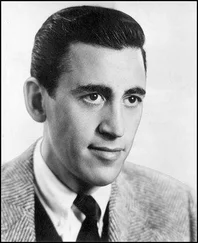J. Salinger - Nine Stories
Здесь есть возможность читать онлайн «J. Salinger - Nine Stories» весь текст электронной книги совершенно бесплатно (целиком полную версию без сокращений). В некоторых случаях можно слушать аудио, скачать через торрент в формате fb2 и присутствует краткое содержание. Жанр: Старинная литература, на английском языке. Описание произведения, (предисловие) а так же отзывы посетителей доступны на портале библиотеки ЛибКат.
- Название:Nine Stories
- Автор:
- Жанр:
- Год:неизвестен
- ISBN:нет данных
- Рейтинг книги:3 / 5. Голосов: 2
-
Избранное:Добавить в избранное
- Отзывы:
-
Ваша оценка:
- 60
- 1
- 2
- 3
- 4
- 5
Nine Stories: краткое содержание, описание и аннотация
Предлагаем к чтению аннотацию, описание, краткое содержание или предисловие (зависит от того, что написал сам автор книги «Nine Stories»). Если вы не нашли необходимую информацию о книге — напишите в комментариях, мы постараемся отыскать её.
Nine Stories — читать онлайн бесплатно полную книгу (весь текст) целиком
Ниже представлен текст книги, разбитый по страницам. Система сохранения места последней прочитанной страницы, позволяет с удобством читать онлайн бесплатно книгу «Nine Stories», без необходимости каждый раз заново искать на чём Вы остановились. Поставьте закладку, и сможете в любой момент перейти на страницу, на которой закончили чтение.
Интервал:
Закладка:
Every afternoon, when it got dark enough for a losing team to have an excuse for missing a number of infield popups or end-zone passes, we Comanches relied heavily and selfishly on the Chief's talent for storytelling. By that hour, we were usually an overheated, irritable bunch, and we fought each other--either with our fists or our shrill voices--for the seats in the bus nearest the Chief. (The bus had two parallel rows of straw seats. The left row had three extra seats--the best in the bus--that extended as far forward as the driver's profile.) The Chief climbed into the bus only after we had settled down. Then he straddled his driver's seat backward and, in his reedy but modulated tenor voice, gave us the new installment of "The Laughing Man." Once he started narrating, our interest never flagged. "The Laughing Man" was just the right story for a Comanche. It may even have had classic dimensions. It was a story that tended to sprawl all over the place, and yet it remained essentially portable. You could always take it home with you and reflect on it while sitting, say, in the outgoing water in the bathtub.
The only son of a wealthy missionary couple, the Laughing Man was kidnapped in infancy by Chinese bandits. When the wealthy missionary couple refused (from a religious conviction) to pay the ransom for their son, the bandits, signally piqued, placed the little fellow's head in a carpenter's vise and gave the appropriate lever several turns to the right. The subject of this unique experience grew into manhood with a hairless, pecan-shaped head and a face that featured, instead of a mouth, an enormous oval cavity below the nose. The nose itself consisted of two flesh-sealed nostrils. In consequence, when the Laughing Man breathed, the hideous, mirthless gap below his nose dilated and contracted like (as I see it) some sort of monstrous vacuole. (The Chief demonstrated, rather than explained, the Laughing Man's respiration method.) Strangers fainted dead away at the sight of the Laughing Man's horrible face. Acquaintances shunned him. Curiously enough, though, the bandits let him hang around their headquarters--as long as he kept his face covered with a pale-red gossamer mask made out of poppy petals. The mask not only spared the bandits the sight of their foster son's face, it also kept them sensible of his whereabouts; under the circumstances, he reeked of opium.
Every morning, in his extreme loneliness, the Laughing Man stole off (he was as graceful on his feet as a cat) to the dense forest surrounding the bandits' hideout. There he befriended any number and species of animals: dogs, white mice, eagles, lions, boa constrictors, wolves. Moreover, he removed his mask and spoke to them, softly, melodiously, in their own tongues. They did not think him ugly.
(It took the Chief a couple of months to get that far into the story.
From there on in, he got more and more high-handed with his installments, entirely to the satisfaction of the Comanches.) The Laughing Man was one for keeping an ear to the ground, and in no time at all he had picked up the bandits' most valuable trade secrets.
He didn't think much of them, though, and briskly set up his own, more effective system. On a rather small scale at first, he began to freelance around the Chinese countryside, robbing, highjacking, murdering when absolutely necessary. Soon his ingenious criminal methods, coupled with his singular love of fair play, found him a warm place in the nation's heart. Strangely enough, his foster parents (the bandits who had originally turned his head toward crime) were about the last to get wind of his achievements. When they did, they were insanely jealous.
They all single-filed past the Laughing Man's bed one night, thinking they had successfully doped him into a deep sleep, and stabbed at the figure under the covers with their machetes. The victim turned out to be the bandit chief's mother--an unpleasant, haggling sort of person. The event only whetted the bandits' taste for the Laughing Man's blood, and finally he was obliged to lock up the whole bunch of them in a deep but pleasantly decorated mausoleum. They escaped from time to time and gave him a certain amount of annoyance, but he refused to kill them. (There was a compassionate side to the Laughing Man's character that just about drove me crazy.)
Soon the Laughing Man was regularly crossing the Chinese border into Paris, France, where he enjoyed flaunting his high but modest genius in the face of Marcel Dufarge, the internationally famous detective and witty consumptive. Dufarge and his daughter (an exquisite girl, though something of a transvestite) became the Laughing Man's bitterest enemies. Time and again, they tried leading the Laughing Man up the garden path. For sheer sport, the Laughing Man usually went halfway with them, then vanished, often leaving no even faintly credible indication of his escape method. Just now and then he posted an incisive little farewell note in the Paris sewerage system, and it was delivered promptly to Dufarge's boot. The Dufarges spent an enormous amount of time sloshing around in the Paris sewers.
Soon the Laughing Man had amassed the largest personal fortune in the world. Most of it he contributed anonymously to the monks of a local monastery--humble ascetics who had dedicated their lives to raising German police dogs. What was left of his fortune, the Laughing Man converted into diamonds, which he lowered casually, in emerald vaults, into the Black Sea. His personal wants were few. He subsisted exclusively on rice and eagles' blood, in a tiny cottage with an underground gymnasium and shooting range, on the stormy coast of Tibet.
Four blindly loyal confederates lived with him: a glib timber wolf named Black Wing, a lovable dwarf named Omba, a giant Mongolian named Hong, whose tongue had been burned out by white men, and a gorgeous Eurasian girl, who, out of unrequited love for the Laughing Man and deep concern for his personal safety, sometimes had a pretty sticky attitude toward crime. The Laughing Man issued his orders to the crew through a black silk screen. Not even Omba, the lovable dwarf, was permitted to see his face.
I'm not saying I will, but I could go on for hours escorting the reader--forcibly, if necessary--back and forth across the Paris-Chinese border. I happen to regard the Laughing Man as some kind of super-distinguished ancestor of mine--a sort of Robert E. Lee, say, with the ascribed virtues held under water or blood. And this illusion is only a moderate one compared to the one I had in 1928, when I regarded myself not only as the Laughing Man's direct descendant but as his only legitimate living one. I was not even my parents' son in 1928 but a devilishly smooth impostor, awaiting their slightest blunder as an excuse to move in--preferably without violence, but not necessarily--to assert my true identity. As a precaution against breaking my bogus mother's heart, I planned to take her into my underworld employ in some undefined but appropriately regal capacity. But the main thing I had to do in 1928 was watch my step. Play along with the farce. Brush my teeth.
Comb my hair. At all costs, stifle my natural hideous laughter.
Actually, I was not the only legitimate living descendant of the Laughing Man. There were twenty-five Comanches in the Club, or twenty-five legitimate living descendants of the Laughing Man--all of us circulating ominously, and incognito, throughout the city, sizing up elevator operators as potential archenemies, whispering side-of-the-mouth but fluent orders into the ears of cocker spaniels, drawing beads, with index fingers, on the foreheads of arithmetic teachers. And always waiting, waiting for a decent chance to strike terror and admiration in the nearest mediocre heart.
One afternoon in February, just after Comanche baseball season had opened, I observed a new fixture in the Chief's bus. Above the rear-view mirror over the windshield, there was a small, framed photograph of a girl dressed in academic cap and gown. It seemed to me that a girl's picture clashed with the general men-only decor of the bus, and I bluntly asked the Chief who she was. He hedged at first, but finally admitted that she was a girl. I asked him what her name was. He answered unforthrightly, "Mary Hudson." I asked him if she was in the movies or something. He said no, that she used to go to Wellesley College. He added, on some slow-processed afterthought, that Wellesley College was a very high class college. I asked him what he had her picture in the bus for, though. He shrugged slightly, as much as to imply, it seemed to me, that the picture had more or less been planted on him.
Читать дальшеИнтервал:
Закладка:
Похожие книги на «Nine Stories»
Представляем Вашему вниманию похожие книги на «Nine Stories» списком для выбора. Мы отобрали схожую по названию и смыслу литературу в надежде предоставить читателям больше вариантов отыскать новые, интересные, ещё непрочитанные произведения.
Обсуждение, отзывы о книге «Nine Stories» и просто собственные мнения читателей. Оставьте ваши комментарии, напишите, что Вы думаете о произведении, его смысле или главных героях. Укажите что конкретно понравилось, а что нет, и почему Вы так считаете.










